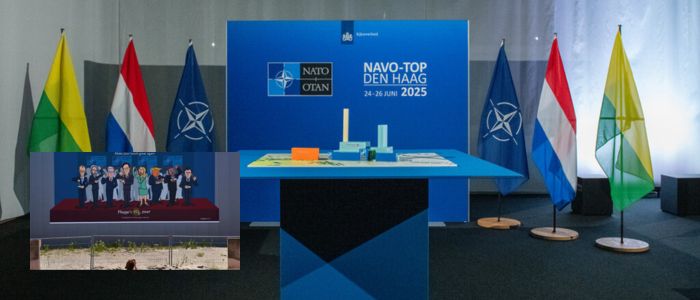Now the Gastrobar Berlage, which used to be a favored meeting point for diplomats and residents alike, near a world-famous art museum, is devoid of patrons, its windows covered with security bars. Its owner, Bianca Veenhof, said there was an eerie quiet at the time of day the cafe would usually be busy with the lunchtime rush.
Officials have shut down roads, cordoned off parking lots, and redirected public transit. Nearby office workers have been told to stay home, and when you try to approach some of the areas near the World Forum summit venue, you're met with metal spans and barricades. The city, long associated with delivering peace and justice via its international courts, is now synonymous with security and restricted movement.
Thousand Mobilized In Largest-Ever Dutch Security Operation
The meeting is the largest security operation ever in the Netherlands during a NATO meeting. Some 27,000 police officers — almost half the nation’s force — are being pressed into service, along with 10,000 members of the defense forces.
Delegations will be accompanied by military police and patrol ships and fighter jets, Apache helicopters and frigates patrol above and below. Air defense systems will be on alert and bomb squads will scour the venue for explosives.
Air security also comes into play. Civilian drones are banned, but military and police drones will watch over summit sites. Police expect protests, potentially including efforts to block one of the city’s main highway arteries, and riot officers were being deployed to manage public dissent.
Cybersecurity measures are also in place, though officials haven't publicly claimed any specific actions. Those cyber defenses are necessary, as leaders from all 32 of NATO’s member countries, including President Trump, are in attendance.
Summit Agenda: Defense Costs and Ukraine
The When the leaders visit to Europe, they’ll start by attending a dinner hosted by Dutch King Willem-Alexander at his palace in a forest near The Hague. Issues expected to be on the summit agenda include raising NATO Netherlands defense expenditures and a continuing war in eastern Ukraine.
The agenda is a reflection of rising global tensions and priorities in global flux. As Washington shifts more attention to China and its borders, U.S. officials are urging Europe to take more responsibility for the defense of the region.
The location, a conference center and theater, sits amid institutions that represent international justice and cooperation. The former U.N. tribunal for the former Yugoslavia is nearby, as are the Organization for the Prohibition of Chemical Weapons and EU legal agencies. The International Criminal and International Courts of Justice are also a stone's throw away, underlining The Hague's global diplomatic significance.
Local Residents and Businesses Feel the Pressure
With the summit looming, large numbers of Muscovites are trying to get out of town to avoid the headache. Berlage Bistro is to close temporarily because the number of customers has been falling for weeks. Veenhof and her partner, chef Bauke van Schaik, say the closure and cancellations are likely to cost their business up to 150,000 euros ($173,000).
Annoyed by the security issues and the missed business, they’re packing up and getting out of town for a bit. “Good friends of ours live in Portugal, so we’re going there for a few days,” Veenhof said. “We will be a little bit further out from all the misery and frustration.”
World

NATO Summit Turns The Hague into High-Security Fortress

The usually quiet and friendly city of The Hague is on lockdown as it morphs into the site for the NATO summit (24–25 June). A huge security clampdown, the Orange Shield, has brought daily life in the city to a real standstill, putting livelihoods, transport and residents under pressure.















